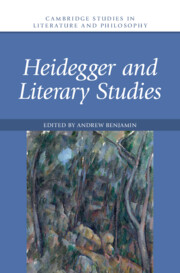Book contents
- Heidegger and Literary Studies
- Cambridge Studies in Literature and Philosophy
- Heidegger and Literary Studies
- Copyright page
- Contents
- Contributors
- Heidegger and Literature: An Introduction to the Question
- I Literature and Poetry
- II Heidegger and Greek Literature
- III Heidegger and Literary Works
- 8 Places of Pain
- 9 The (Im)possibility of Homecoming
- 10 Heidegger and Blanchot
- 11 Thomas Mann and Martin Heidegger
- 12 Travels in Greece
- 13 Hölderlin’s Heidegger, Heidegger’s Mourning
- Heidegger, Index of Works
- General Index
- References
10 - Heidegger and Blanchot
‘Wherefore Poets in Time of Distress?’ (Hölderlin, Rilke)
from III - Heidegger and Literary Works
Published online by Cambridge University Press: 09 November 2023
- Heidegger and Literary Studies
- Cambridge Studies in Literature and Philosophy
- Heidegger and Literary Studies
- Copyright page
- Contents
- Contributors
- Heidegger and Literature: An Introduction to the Question
- I Literature and Poetry
- II Heidegger and Greek Literature
- III Heidegger and Literary Works
- 8 Places of Pain
- 9 The (Im)possibility of Homecoming
- 10 Heidegger and Blanchot
- 11 Thomas Mann and Martin Heidegger
- 12 Travels in Greece
- 13 Hölderlin’s Heidegger, Heidegger’s Mourning
- Heidegger, Index of Works
- General Index
- References
Summary
When Martin Heidegger famously rose in 1946 to pay tribute to Rainer Maria Rilke on the twentieth anniversary of the poet’s death, it was hardly by accident that he framed his interpretation of Rilke’s work by quoting Friedrich Hölderlin’s now canonical question (‘Wherefore poets…’) regarding the task of poetry in the time called the present, lines that also enabled Heidegger to voice his own distress at the state in which postwar Germany found itself and, more obliquely, the extent of his own involvement in the events of the previous decade and a half. During these postwar years, there were arguably few more attentive or perceptive readers of Heidegger’s writings on poetry than the French novelist, critic, and thinker Maurice Blanchot, whose own opposition to National Socialism was from the outset forceful and unyielding. This chapter examines Blanchot’s borrowings from Heidegger (as deployed in Blanchot’s account of the French poet Stéphane Mallarmé), his rigorous and probing criticisms of Heidegger’s thinking, and contrasts with that of Heidegger Blanchot’s own significantly divergent interpretation of the work of Hölderlin and Rilke.
- Type
- Chapter
- Information
- Heidegger and Literary Studies , pp. 253 - 277Publisher: Cambridge University PressPrint publication year: 2023



